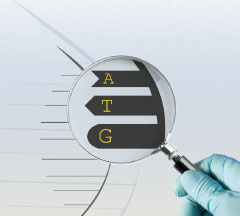Kickstart your cancer research with long-read sequencing
SMARTer PCR cDNA Synthesis Kit has advanced breast cancer research through long-read sequencing

Genomic changes are a characteristic feature in breast cancer cells, such as those that alter splicing events and transcriptomes (Turnbull and Rahman 2008). Existing short-read sequencing has helped identify some of these splicing events and their resulting isoforms (Stricker et al. 2017). However, short-read sequencing requires transcript assembly, and existing assembly tools remain limited in their ability to reconstruct the longer transcripts encoded in eukaryotic genomes (Amarasinghe et al. 2020).
Long-read (LR) sequencing circumvents genome assembly tools by sequencing genome segments up to several megabases long (Logsdon et al. 2020). This allows more genomic structural variants to be discovered, uncovering novel sources of genetic variation (De Coster et al. 2021). Reference-based transcript reconstruction is not required for LR RNA sequencing, which enables the analysis of full-length transcripts (Sharon et al. 2013). LR RNA sequencing has demonstrated value for the identification of tumor-associated spliced isoforms in at least one cancer research study (Tang et al. 2020). Harnessing the power of LR sequencing, however, requires a robust cDNA synthesis protocol that enriches full-length cDNA sequences with high fidelity and sensitivity.
Highlighted product for breast cancer research
Our SMARTer PCR cDNA Synthesis Kit is an ideal library preparation kit for LR sequencing with the PacBio sequencer. Researchers from the Jackson Laboratory for Genomic Medicine harnessed our kit to produce robust LR sequencing reads to identify novel isoforms in breast cancer specimens (Figure 1)(Veiga et al. 2022). The pipeline classified LR-seq isoforms based on their similarity with GENCODE (Frankish et al. 2019) isoforms and identified novel isoforms within or not classified in the GENCODE database.

Figure 1. How the SMARTer PCR cDNA Synthesis Kit was used to identify novel isoforms in breast tumors. Normal and tumor tissues were collected before long-read (LR) and short-read sequencing libraries were prepared. From the sequencing data, isoforms were identified from the LR-seq data and categorized. Figure reproduced from a prior publication (Veiga et al. 2022), original available at https://europepmc.org/article/pmc/pmc8769553, used under CC BY 4.0 / Cropped from original.
Adopting this approach helped them identify thousands of previously uncharacterized isoforms for both normal and tumor tissues with an average length of 2.6 kb (Figure 2). This is longer than the average length of 1 kb achieved by current MAS-seq pipelines. At least a quarter of the novel isoforms in breast cancer tumors were not identified by short-read RNA sequencing (Figure 3). The LR sequencing datasets thus revealed a level of genomic complexity not observed with standard annotation databases such as RefSeq and GENCODE. Many of these isoforms were also observed in genes participating in key breast cancer-associated pathways and overrepresented in oncogenes (Figure 4). For example, genes associated with MTORC1 signaling and metabolic pathways were enriched for novel isoforms. AS events thus provide prognostic value as well, revealing novel disease pathways and potential therapeutic targets against breast cancer.

Figure 2. Long-read sequencing, facilitated by the SMARTer PCR cDNA Synthesis Kit, can detect isoforms in individual breast cancer or normal samples. Each stacked bar graph represents a tissue sample, along with its characteristics. Figure reproduced from a prior publication (Veiga et al. 2022), original available at https://europepmc.org/article/pmc/pmc8769553, used under CC BY 4.0 / Cropped from original.

Figure 3. Long-read sequencing allows novel isoforms not detected by short-read sequencing to be identified. Left: Distribution of isoforms from both normal and tumor samples by splicing category (Figure 1). Right: The proportion of distinct LR-seq isoforms detected by short-read sequencing. Figure reproduced from a prior publication (Veiga et al. 2022), original available at https://europepmc.org/article/pmc/pmc8769553, used under CC BY 4.0 / Cropped from original.

Figure 4. Multiple pathways are enriched for genes with novel isoforms detected by long-read sequencing. Left: Gene pathways within the MSigDB enriched for genes with novel isoforms in tumor tissues. Right: Identifying oncogenes and tumor suppressors overrepresented or underrepresented with unannotated isoforms. Figure reproduced from a prior publication (Veiga et al. 2022), original available at https://europepmc.org/article/pmc/pmc8769553, used under CC BY 4.0 / Cropped from original.
Try the SMARTer PCR cDNA Synthesis Kit today
LR sequencing is fast becoming the future of high-throughput sequencing. Here, you can see how using the most sensitive cDNA synthesis kit can help researchers discover previously unappreciated isoforms and splicing events that contribute to breast cancer. Speak with our experienced team today to see how you can harness the power of LR sequencing.
References
Amarasinghe, S.L., Su, S., Dong, X., Zappia, L., Ritchie, M.E., and Gouil, Q. (2020). Opportunities and challenges in long-read sequencing data analysis. Genome Biology 21, 30. 10.1186/s13059-020-1935-5.
De Coster, W., Weissensteiner, M.H., and Sedlazeck, F.J. (2021). Towards population-scale long-read sequencing. Nat Rev Genet 22, 572–587. 10.1038/s41576-021-00367-3.
Frankish, A., Diekhans, M., Ferreira, A.-M., Johnson, R., Jungreis, I., Loveland, J., Mudge, J.M., Sisu, C., Wright, J., Armstrong, J., et al. (2019). GENCODE reference annotation for the human and mouse genomes. Nucleic Acids Research 47, D766–D773. 10.1093/nar/gky955.
Logsdon, G.A., Vollger, M.R., and Eichler, E.E. (2020). Long-read human genome sequencing and its applications. Nat Rev Genet 21, 597–614. 10.1038/s41576-020-0236-x.
Sharon, D., Tilgner, H., Grubert, F., and Snyder, M. (2013). A single-molecule long-read survey of the human transcriptome. Nature Biotechnol, 31(11), 1009–1014. 10.1038/nbt.2705
Stricker, T.P., Brown, C.D., Bandlamudi, C., McNerney, M., Kittler, R., Montoya, V., Peterson, A., Grossman, R., and White, K.P. (2017). Robust stratification of breast cancer subtypes using differential patterns of transcript isoform expression. PLOS Genetics 13, e1006589. 10.1371/journal.pgen.1006589.
Tang, A.D., Soulette, C.M., van Baren, M.J., Hart, K., Hrabeta-Robinson, E., Wu, C.J., and Brooks, A.N. (2020). Full-length transcript characterization of SF3B1 mutation in chronic lymphocytic leukemia reveals downregulation of retained introns. Nature Commun, 11(1), 1438. 10.1038/s41467-020-15171-6
Turnbull, C., and Rahman, N. (2008). Genetic predisposition to breast cancer: past, present, and future. Annu Rev Genomics Hum Genet 9, 321–345. 10.1146/annurev.genom.9.081307.164339.
Veiga, D.F.T., Nesta, A., Zhao, Y., Deslattes Mays, A., Huynh, R., Rossi, R., Wu, T.-C., Palucka, K., Anczukow, O., Beck, C.R., et al. (2022). A comprehensive long-read isoform analysis platform and sequencing resource for breast cancer. Sci Adv 8, eabg6711. 10.1126/sciadv.abg6711.
Featured products
Takara Bio USA, Inc.
United States/Canada: +1.800.662.2566 • Asia Pacific: +1.650.919.7300 • Europe: +33.(0)1.3904.6880 • Japan: +81.(0)77.565.6999
FOR RESEARCH USE ONLY. NOT FOR USE IN DIAGNOSTIC PROCEDURES. © 2025 Takara Bio Inc. All Rights Reserved. All trademarks are the property of Takara Bio Inc. or its affiliate(s) in the U.S. and/or other countries or their respective owners. Certain trademarks may not be registered in all jurisdictions. Additional product, intellectual property, and restricted use information is available at takarabio.com.





